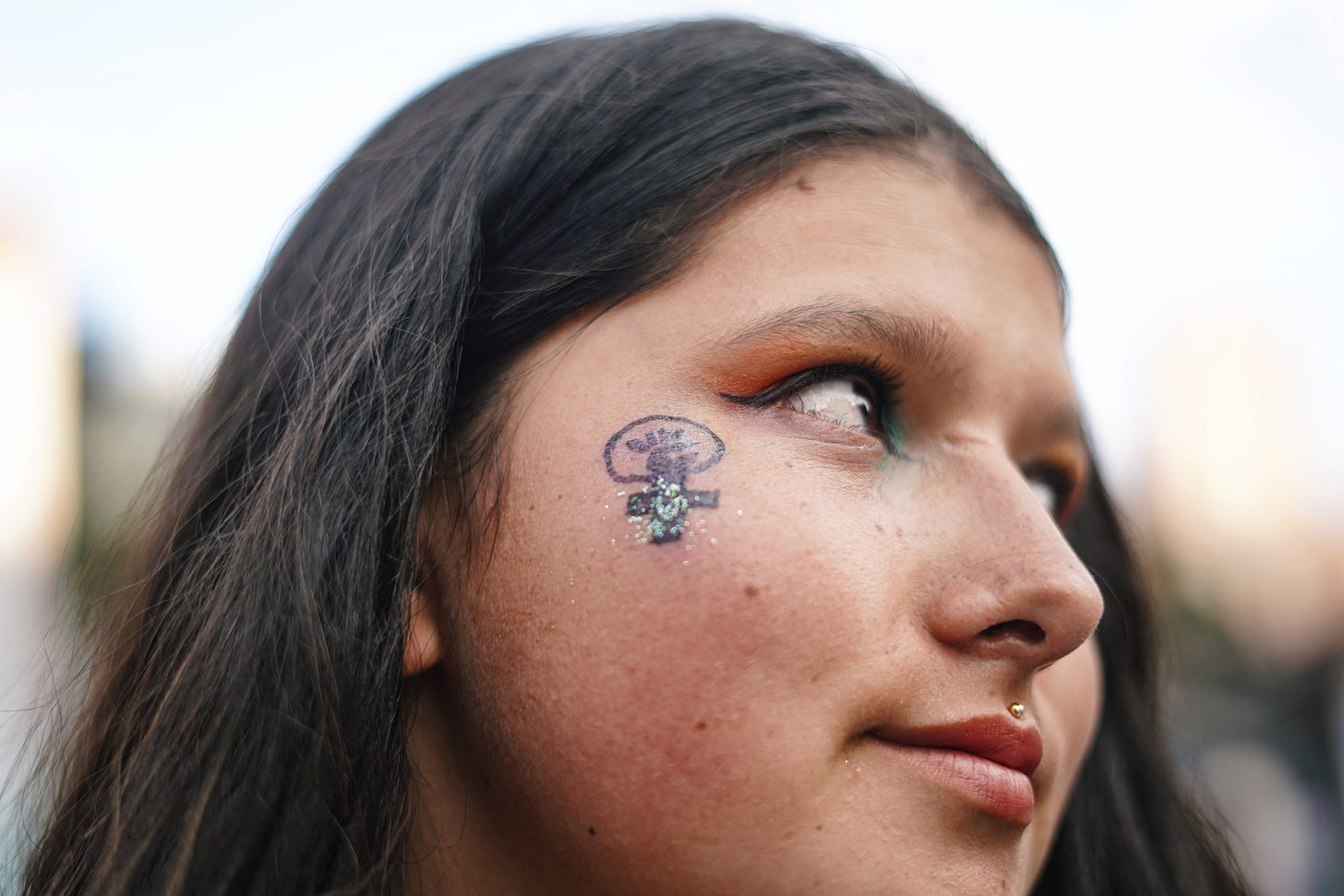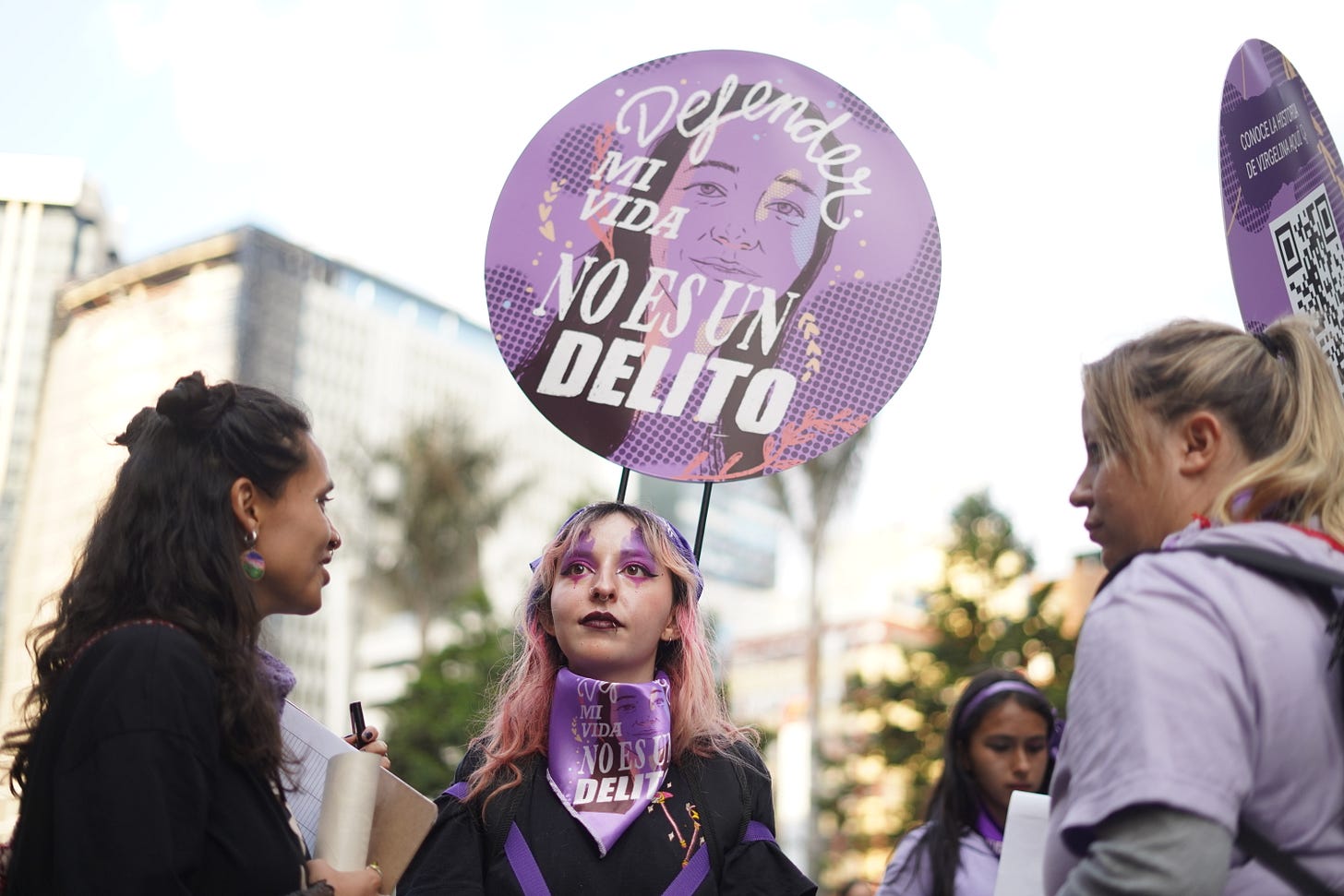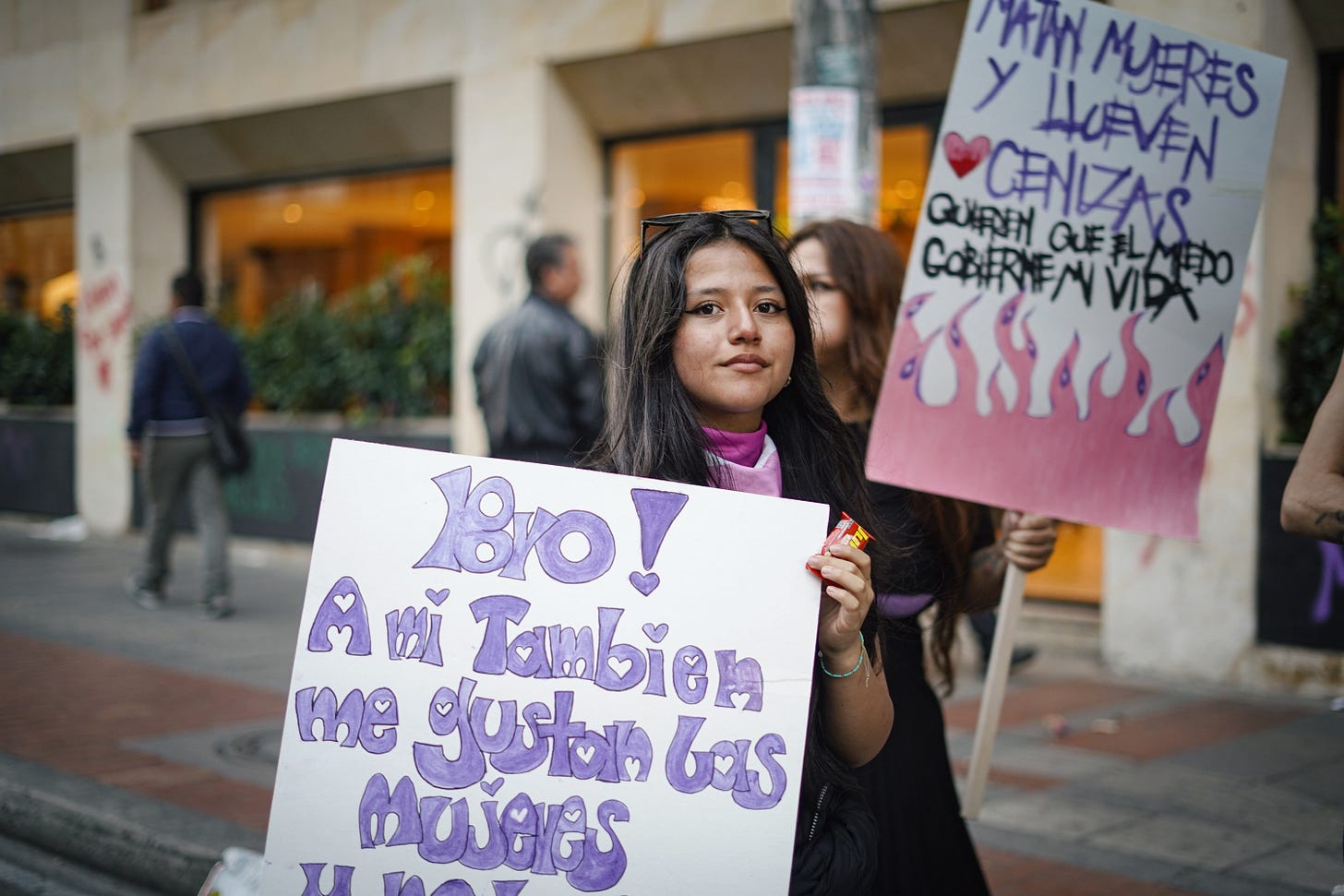Feminist rage against violence in Colombia
Riot police attacked demonstrations against gender-based violence in Bogota as similar marches united women in more than a dozen countries throughout the region
This piece originally appeared at Ojalá magazine and was commissioned as part of a special collaboration between PWS and executive Ojalá editor Dawn Marie Paley
Following a surge of femicides in the first two months of 2024, feminists throughout Colombia took to the streets with force on March 8.
Feminist organizations assembled at different locations in Bogotá at noon on International Working Women's Day. The plan was to march to Bolivar Plaza in the historic downtown. Later in the evening, a concert by several local artists would bring the day of remembrance and struggle to a close, accompanied by the cry: "All of Latin America will be feminist!"
Preparations for the march in Colombia’s capital began a month earlier, organized, as they have been for the last five years, by Bogotá’s autonomous feminist organizing network known as "Somos un Rostro Colectivo" [Our Collective Face]. Those who wanted to participate in the March 8 events met weekly in different parts of the city. Everyone had something to contribute to the march: some take photographs, others bring legal knowledge, others support with their art, etc.
The main slogan for March 8 in Bogotá this year was: "We weave and defend life through collective strength. We demand justice and dignified autonomy."
Participants demanded justice for victims of gender violence in Colombia, which often goes unpunished. The Public Prosecutor's Office has indicated that three cases of gender violence are recorded every hour. The rate of convictions is even more alarming: the same entity details that impunity in cases for which there is a formal case report is nearly 98 percent.
Bogotá was not the only city with a huge mobilization on March 8. The chants of Colombian women were heard in Barranquilla, Cartagena, Medellín, Bucaramanga, and Cali. Large numbers turned out in each of these cities. According to the Mayor's office, at least 8,000 people marched in Bogotá.
The diversity of protesters was striking and overwhelming. There were pregnant women with huge bellies, teenagers that had just turned 15, babes in arms and girls holding hands with their sisters and mothers. Unlike previous years, there were also cisgender men, more than one would expect. There was abundant multiplicity.
For at least the last three years, a contingent of Black women whose affinity group is called the Anti-Racist Black Bloc (no relation to the black bloc tactic) have played a significant role in feminist protests. This year there were even more women in this contingent, wearing their distinctive black and yellow scarves. "Being a feminist doesn't make you less racist," they shouted, as other marchers cheered them on.
Close behind them were trans and non-binary folks, who have spoken out against feminist spaces because they have been the subject of insults and physical violence during previous mobilizations on March 8 and November 25, the International Day for the Elimination of Violence against Women. Despite these attacks, they decided to participate, claiming space and demanding respect. They succeeded.
As they marched, Black and trans women waved huge white, black, green and red flags for Palestine. Every affinity group that marched that day made some reference to the genocide in Gaza and their opposition to the Israeli occupation. Colombian women clearly regard rejecting genocide in Palestine as a feminist issue.
Daniela Villamizar, a mother, attended the march with a sign that read, “Care work sustains the world." In an interview with Ojalá, she said that, as a feminist, she’s committed to making the work of caregiving, which has been feminized, visible. "The movement should see it as a duty to support mothers and those who are at home doing care work without pay."
A state of emergency due to patriarchal violence
"Today for me, tomorrow for everyone!" and "Abort your Galán [a reference to the Mayor of Bogotá]" were just a couple of the hundreds of graffitis that covered the walls of Bogotá’s downtown. Direct action was present not only during the march, but also in the days that followed, as the media fixated on alleged acts of vandalism.
The women's movement in Colombia is furious. And rightly so.
To date, 2024 has already been particularly violent. In just over the year’s first two months, 32 femicides have been registered. Several of these have become widely known as a result of their extreme cruelty. There were 525 victims of femicide last year, according to Colombia’s Femicide Observatory, an NGO.
This bloody panorama means even though Colombia has laws on the books against gender-based violence (Law 1257 of 2008) and femicide (Law 1761 of 2015). Gustavo Petro's administration has described itself as feminist and even inaugurated a Ministry of Equality last year, which enabled Congress to pass a law declaring that patriarchal violence is an emergency.
But yet despite these laws and public policies, women continue to be murdered. Most of the killings happen in situations in which victims had informed authorities that they were at risk. Around half of the victims of femicide are mothers. Since 2020, almost a thousand minors have been orphaned by this type of crime.
Ana María Granda is an economist whose work focuses on economies of care. In her view, the feminist movement, despite the structural violence in the country and internal debates among activists, has been growing by leaps and bounds.
"I have been attending these marches for five years and this year I saw so much activity. There were trans women, Black women, and trade unionists. This is a huge achievement. The city understands that today is our day to demonstrate," said Granda. She told me that she headed straight to the march after an exhausting day at work. She stayed until the end.
Police repression
Amidst calls and chants for justice, Bogotá’s feminist movement took over the city center. The repression began as they approached Bolivar Plaza. From the outset, about a hundred police officers were visible on the periphery of the march. As night fell, so did the tear gas and tasers.
Once it was dark, without any explanation or indication as to who gave the order, police surrounded Bolivar Plaza.
Luckily, and thanks to Colombia’s long history of social movement militancy, a team of women defenders were prepared to deal with repression. The most vulnerable were quickly shuttled out of the area, dialogue with the police was initiated, and substances that would reduce the impact of the tear gas were at the ready.
Demonstrators gradually began to regroup. They refused to allow fear to steal their right to the street and to demand to live without violence, the very same violence that they were facing. Hours later, the Mayor's office washed its hands of blame, as did the national government.
Later, President Petro appeared on television declaring his support for women's struggles. He spoke about his government's gender policies and apologized for the "failure to respond in an appropriate manner" to the demonstrations.
Things were worse in the city of Medellín. In the days following March 8, the Mayor's office printed “Wanted” posters bearing the faces of some of the protesters, accusing them of vandalism and offering a reward for information about their locations and identities.
In Antioquia, the department of which Medellín is the capital, 19 femicides have been recorded since the start of the year. There are also powerful criminal networks in the city dedicated to sexual exploitation, particularly of impoverished girls. Feminist fury on the streets was to be expected.
Most of the women who spoke to Ojalá via message from Medellín said that the police presence and the excessive use of force tarnished the march and shouldn’t have happened. Many complained to local governments for failing to guarantee a safe space for the girls and young women who took to the streets.
One of the women criminalized by Medellín’s City Hall spoke to El Excelsior, a national newspaper. Her face was one of the six that had appeared on the “Wanted” posters.
She told the paper that she came to march peacefully, prompted by her own past, as someone who had been abused on several occasions, as well as on behalf of other women who have been abused. "I was already angry and ready to shout. Now I’m even angrier," she said. "I’m going to continue wearing my purple scarf until the very end, even if I'm afraid.”
In the face of repression, strength and unity emerged in the streets. After the tear gas and the fear of the stun guns dissipated, feminists reclaimed the main streets on March 8, spray painting, hanging out in the dark in the square, listening to music and dancing into the night.
They held fast to the knowledge that together, we are like waves: we rise.
The Big Headlines in LATAM
Venezuelan opposition candidate María Corina Machado on Friday named a replacement to face President Nicolas Maduro, in upcoming July elections, and pledged to continue fighting against political disqualification.
Machado announced the name of her replacement, academic and university professor Corina Yoris, following an increased government crackdown on her candidacy after the arrests of nearly a half-dozen members of her campaign team and the 15-year disqualification from holding public office imposed on her by the Venezuelan Comptroller General's Office, controlled by the Maduro government.
Security conditions in Port-Au-Prince continued to worsen this week as officials scramble to form an interim government. Gangs in Haiti attacked wealthy neighborhoods in the capital, leaving more than a dozen dead on Wednesday.
Colombia dissolved a ceasefire with dissident FARC group Estado Mayor (EMC), and initiated a large-scale military offensive against the rebel group in Cauca after EMC killed 6 members of the indigenous guard in the region— an unarmed peace-keeping force.
Thousands of troops were deployed in a sweeping operation that seeks to forcibly remove EMC from the region and capture it’s commander, Néstor Gregorio Vera Fernández, alias “Iván Mordisco”.
Ship’s Business
We’re working on a new logo! Our amazing friend and talented artist Rithe Guardian has sent over some mockups, but we have yet to pick a final design. Don’t be surprised if you see some piratey changes in our imagery and on the website over the next few weeks.
We can safely tease one of the design options we think. Just keep in mind it’s a work in progress!
Spanish Word of the Week
Por si las moscas - “just in case”
The literal translation of Por si las moscas would be “for if there are flies”, but the phrase is used to describe preparation for an event that may or may not occur.
No olvides el paraguas. Por si las moscas- “Dont forget your umbrella, just in case.”
We’d love to know more about the origin of this phrase. Do you know where it comes from? Drop a comment illuminating us.






